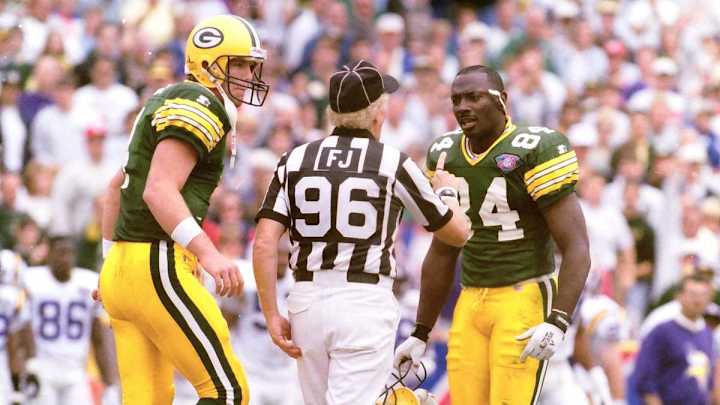Case for the Hall: Sterling Sharpe

Sterling Sharpe was recently announced as a senior finalist for the Pro Football Hall of Fame.
Sharpe was forced to retire after a neck injury in 1994 ended his career, otherwise, he likely would have been inducted a long time ago.
Sharpe was drafted in the first round by the Packers with the seventh overall pick. He was paired early in his career with Don Majkowski. A prolific pairing on paper, but unfortunately Majkowski, nicknamed "The Majik Man", was unable to stay healthy during his tenure. He only started all 16 games once, in 1989 when the team earned the nickname “The Cardiac Pack.”
Everything changed for the Packers in 1992 when Brett Favre took over at quarterback after Majkowski exited the game with an injury.
Prior to Favre taking over, Sharpe had two 1,000-yard seasons and one season with 90 catches.
When Favre took over, Sharpe took off.
Perhaps the greatest trademark of a great player is when the whole world knows he’s getting the ball, and the opponent still can’t stop him.
That was the case when Michael Jordan was with the Chicago Bulls. When the game was on the line, the world knew where the ball was going. The defense was powerless to stop it, and most fans watching knew if he got a shot up, it was going in.
That’s similar to the way Sterling Sharpe was able to operate when he was in Green Bay.
A young Brett Favre was reliant on his great receiver.
Sharpe’s greatness didn’t garner the respect of other receivers that played in the same era like San Francisco’s Jerry Rice or Dallas’ Michael Irvin, but Sharpe was every bit as good.
In three seasons with Favre, Sharpe had more than 100 catches in two of the three years. He had a three-season stretch of 1,461, 1,274, and 1,119 yards.
He received MVP votes in two of those three years and caught double-digit touchdowns in all three of those years including a whopping 18 in 1994.
He led the league in receptions in 1992 and 1993.
The only thing missing from Sharpe's resume is longevity.
Longevity has not kept players out of the Hall of Fame in the past. Terrell Davis did not have a long career. He played the same amount of seasons as Sharpe (seven), but famously ran over the Packers in Super Bowl XXXII, earning MVP honors.
He ran for more than 2,000 yards the following season, and was inducted into the Hall of Fame despite only playing in 78 games in his career.
Sharpe's numbers stack up to his peers from the era he played in.
Only two receivers finished ahead of Sharpe in terms of receiving yards in his career. San Francisco’s Jerry Rice was one of them, and he is in conversations discussing who is the greatest receiver ever.
The second Henry Ellard who played for two different teams in the seven years his career overlapped with Sharpe's.
Sharpe is second only to Rice for receptions and touchdowns during his time in Green Bay.
There were not many receivers more prolific during his career than Sharpe.
While he never played in a Super Bowl, Sharpe does have a great moment in the playoffs as well.
With the team trailing 24-21 in Detroit, Brett Favre rolled to his left. He stopped and saw Sharpe breaking open on the play, and heaved the ball toward the end zone.
Sharpe was all alone, caught the ball, and the Packers won 28-24. It was the first time the Packers had won a playoff game under Mike Holmgren.
Moreover, it was the first time they’d won a playoff game period since the 1982 season.
One of the great questions that surrounds Sharpe’s career is what could have been. He already was great, but could he have been better?
He likely would have been one of the key cogs in a Packers team that won 48 games between 1995 and 1998.
Sharpe had to retire before the team was ready to take off. He put up all those receiving numbers before Brett Favre reached the peak of his dominance.
Favre won his first MVP in 1995, the year after Sharpe retired. What could Sharpe have done with that version of Favre?
That’s a great question. One we'll never find out the answer to.
What isn't a question is that Sharpe was one of the dominant players of his era. He has a great case to be inducted, and his career being shortened should not hinder him.
